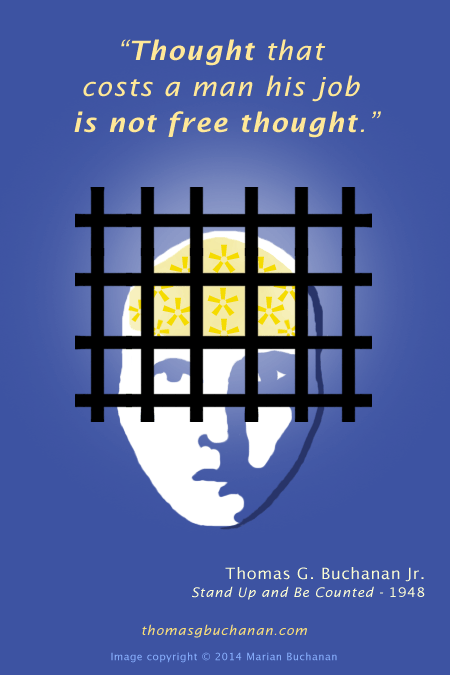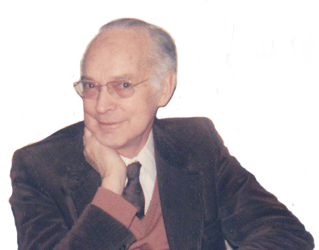 After Thomas G. Buchanan was fired from The Washington Evening Star for his membership in the Communist Party, a group of fellow journalists bought him a one-page space in a New York periodical to allow him to express his perspective on the matter. The article was also published in the June 1948 issue of The Guildsman, the newsletter of the Washington Newspaper Guild (WNG), with an introduction by Nick Blatchford, Chairman of the Committee in Defense of Tom Buchanan.
After Thomas G. Buchanan was fired from The Washington Evening Star for his membership in the Communist Party, a group of fellow journalists bought him a one-page space in a New York periodical to allow him to express his perspective on the matter. The article was also published in the June 1948 issue of The Guildsman, the newsletter of the Washington Newspaper Guild (WNG), with an introduction by Nick Blatchford, Chairman of the Committee in Defense of Tom Buchanan.
The introduction is worded very simply. It explains that the committee in Tom’s defense had requested a copy of Tom’s piece so that all Guild members could read it, in preparation for the referendum they were being asked to vote on in connection with the case. It offers a brief bio of Buchanan, relays the positive opinions his co-workers and sources had of him, and concludes with this thought:
“We publish Tom Buchanan’s statement below because we think it should be heard.
Because we believe in a free press.”
(For more about the intro, the other related pieces in that issue of The Guildsman, and the media coverage of the Buchanan Case, please see the blog post titled “1948 – The media report on the first case of a blacklisted journalist.”)
Stand Up and Be Counted
The Washington Evening Star has come forward with a novel interpretation of the freedom of the press.
According to the revised, 1948 version, a newspaper is entitled to discharge any reporter whose political views are not acceptable to the management, without raising any question as to the accuracy or efficiency of his work, or charging him with any wrongful act.
The employe’s own, free statement of his political affiliation, given in response to the employer’s query, is held to be grounds for instant dismissal.
I have a personal interest in The Star’s new policy,
As a Communist, I was its initial victim.
But I think the case has very far-reaching significance, extending beyond me, beyond The Star, beyond the Communist Party, to encompass the entire progressive movement in this country.
* * *
The business of being fired didn’t take long.. . . .
Editor McKelway, who told the Army in August 1942: “I regard Mr. Buchanan as a man of unusual intelligence, initiative and resource … His own ability, his background and his work on this newspaper would fit him to be a candidate for a commission,” simply informed me that he had heard I was a Communist. He hoped it wasn’t true.
I told him it was.
In that case, he declared, my job would have to be terminated—at once.
Was there any indication, I asked, that my political views had ever prompted me to distort the facts in any story I had written, or otherwise interfered with my value to The Star as a reporter?
No, he admitted. My work had always been satisfactory.
It was not what I had done in the past, but what I might do in the future—or rather, what other people might do to me—that alarmed him. His chief concern was that I might be called before some Congressional investigating committee or similar group about my activities as a Communist—thus bringing “discredit” on the paper, as one of its employes.
* * *
The unique characteristics of The Star’s position in my dismissal, described by the local press as the first such case to come before the American Newspaper Guild, is the fact that political views and affiliation are the sole basis for discharge.
As recently as last November, a National Labor Relations Board arbitrator ruled (in the Spokane-Idaho Mining Company case) that Communist Party membership was not grounds for dismissal, even if it were combined with violation of a plant rule against unauthorized distribution of literature.
In my case, there is, of course, no charge of violating the country’s laws, or even a company regulation—the pretext by which the mining company sought to justify its action. The Star’s position is correspondingly weaker than one which already has been ruled by a Federal arbitrator to be against the public interest.
If it is lawful for one employer, in an industry which prides itself on objectivity and its dedication to intellectual freedom, to take this position, clearly every employer is entitled to do the same. Should the courts uphold them in this policy, it will be widely adopted.
Under those circumstances, it is difficult to see how acknowledged leftists are going to find employment anywhere in private industry.
Once the precedent is established that management may set a political test in the hiring and firing of personnel, members of any organization to the left of Attorney General Tom Clark will have this alternative:
1. To deny such affiliation, whenever they apply for a job.
2. To become public charges, incapable of exercising their right to employ their talents to earn an honest living.
* * *
There is a theory, sedulously fostered by reaction, that Communists and other left-wingers habitually deny their political affiliations in order to operate “under cover.” This view has even a certain vogue in labor and liberal circles.
On December 10, 1946, Milton Murray—at that time, president of the American Newspaper Guild and a leading anti-Communist—told a Washington radio audience:
“All I ask of the Communists is to stand up and identify themselves.”
Provided they did so, he indicated, he was willing to go to the mat for their rights as union members. Not long ago, Eleanor Roosevelt told her readers she could not understand why the Communists weren’t willing to stand up for their ideals and be counted.
The prospect of having to conceal his political views from his employer, in order to hold a job, would be distasteful to anybody. To a Communist or a member of one of the progressive organizations now being labeled Communist, it is particularly so.
You do not join such an organization today unless your conviction of the justice of its program is so strong that you feel compelled to defy the continual threat of persecution which membership entails.
You do not give up your time and energy to such an organization, except as a matter of principle.
You have nothing to gain but self-respect.
Your affiliation, therefor, is not something to be concealed, nor to be “admitted” under duress, but to be affirmed with dignity and pride.
* * *
The Mundt-Nixon Bill, introduced by the Committee on Un-American Activities, is based ostensibly on the supposed disposition of “radicals” to pose as supporters of Taft or Truman. The proposed law, it is contended, is designed to make it illegal for them to deny their political affiliation.
It follows as an inevitable corollary that open acknowledgement of leftist affiliation must be legal—must, in fact, be the proper course of action for left-wingers to adopt. Otherwise, the bill’s requirement that leftist organizations shall register the names of all their members with the Attorney General is quite evidently compulsory self-incrimination, and hence unconstitutional.
Certainly it is absurd to assert that at the precise instant a citizen enters the election booth to cast his ballot, it is improper to ask him how he intends to vote, yet at any other time he should be compelled to disclose his political preference. Once having taken this position, however, it is sheerest hypocrisy to maintain that an individual who complies with the recommended course of procedure can properly be penalized for his compliance.
* * *
Speech that costs a man his job is not free speech.
Thought that costs a man his job is not free thought.
To Mrs. Roosevelt, and to all whose advice has been, “stand up and be counted,” I now reply that I am on my feet.
It is time for them to stand up and be counted, too.
THOMAS G. BUCHANAN, JR.
